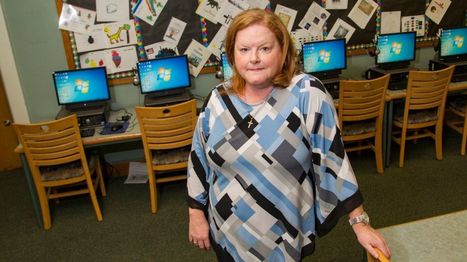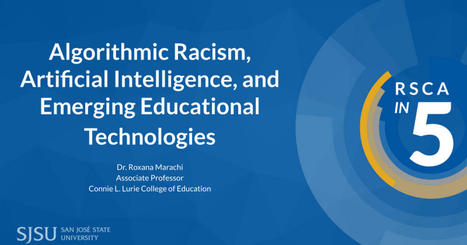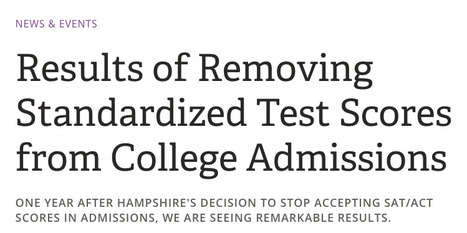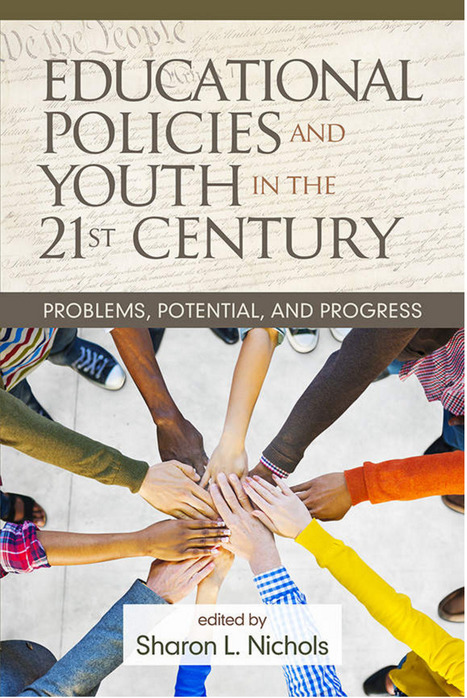 Your new post is loading...
 Your new post is loading...
By Tom Chorneau (California) "One of the Legislature’s leaders on education is fed up with the multi-state consortium that provides schools with assessments, and has suggested that California should consider going it alone. Assemblyman Patrick O’Donnell, D-Long Beach and chair of the education committee in the lower house, said in an interview last week that the Smarter Balanced Assessment Consortium has failed to give teachers useable feedback from interim exams and doesn’t seem too interested in fixing the problem. “I think California ought to think about going it alone,” he said. “I don’t think we need to be a member of the consortium. We can develop these tools on our own if they are not going to develop them for us. So, my question becomes, why are we in this consortium?” O’Donnell is running legislation aimed at getting the state and school districts to provide classroom teachers with better interim data. AB 1035 would clarify that the Legislature expects student scores on interim assessments will be recorded so that teachers can view them by the standard being tested. Interim testing is considered an extremely valuable component because it gives teachers early insight into what material students are having trouble comprehending. But the current system delivers a single score on a broad block of content that might contain multiple standards. Teachers are also not able to see actual student responses to specific test questions, which prevents the kind of ‘item analysis’ educators had hoped to conduct using the new platform. O’Donnell’s bill passed out of the state Senate last week without dissent and returned to the Assembly for concurrence on only minor amendments. “This way the teacher will be able to tell what standard a student is struggling with,” O’Donnell said. “Right now, with the way the interim assessments are being recorded, you can’t do that.” The consortium is one of two established in 2010 with a grant from the Obama administration to design tests that were aligned with the Common Core curriculum standards. As many as 45 states at one point utilized the assessments developed by one of the consortiums but, largely because of a shift in political sentiments related to the Common Core itself, only 27 states used the consortium assessment in 2016-17. California joined the Smarter Balanced group in 2011 when there were a total of 30 states participating. Today there are only 16. California is by far the largest state still a member of Smarter Balanced, which also includes Michigan, Washington, North Carolina and Oregon. Officials at Smarter Balanced have said they will make the changes needed to give teachers scores by content standard, but O’Donnell remains skeptical. “I met with the executive director and we held a hearing on the issue earlier this year,” he said. “I understand that they will be making improvements, but I’m still concerned that SBAC doesn’t appreciate the importance of the issue.”
For full post, please see:
https://www.cabinetreport.com/curriculum-instruction/data-flap-could-lead-ca-to-drop-test-consortium
By Cher Keisecker Sunday, January 28 is International Privacy Day. Please, when you think of privacy, remember that in today’s high-tech classrooms, K-12 students are a captive audience, in a state of nearly constant surveillance and ever increasing data collection. Student data does not stay in the classroom. Parents cannot opt out of the data collection and many worry about the lack of privacy and security with student data and parents worry how this data could be used to profile students. The College Board, owners of the SAT college entrance assessment, just added to this concern. The new SAT is 100% Common Core aligned and Colorado, like other states, mandates the SAT assessments. Colorado students must take the PSAT in grades 9, 10 and SAT in grade 11. Parents of high school students with disabilities recently received this letter from their child’s school, saying the College Board must have access to their child’s disability records without limitation and if needed, any additional or supplemental data requested to verify that the student needs accommodations when taking the SAT test in Colorado this Spring. The College Board letter also lists subcontracted corporations who will have access to the students’ disability records (see this list below). With this demand for extremely sensitive data, to be disclosed to subcontractors, the state of Colorado and the College Board have put parents between a rock and a hard place. Parents feel like they are held hostage. (We know students’ disability records have a high monetary value. We also know that HIPPA does not protect student records. Have you ever seen a student’s 504 medical file or IEP file? These files can contain diagnoses, very personal mental and/or medical health information, information on student and family background, behaviors, attitudes and beliefs.) Is it ethical that a parent must choose between their child having accommodations and a fair shot on these high-stakes mandated tests, or protecting their child’s privacy knowing that their disability records will be shared with the College Board and accessed by outside corporations: Pearson, Conduent Inc. (formerly Xerox), ETS, and Alorica Inc. Should states like Colorado require that parents grant the College Board and subcontractors access to very sensitive documents about their children? Why do these subcontracted companies doing support work need access to disability data? Why does Pearson need access to the Student Data Questionnaire, when Pearson is only scoring answer sheets? Of course we understand the need to verify that the child does have an IEP or 504 plan and does require specific accommodations, but instead of giving companies access to this information,couldn’t the student’s disability status be verified by the school principal or even district or state school board by checking the records and telling College Board, “Yes, these accommodations have been verified.”? Is requiring this sensitive data sharing a violation of FERPA?We know that the College Board also sells licenses to student data. Keep in mind that the subcontractors that the College Board listed in the accommodation letter do not include the thousands of entities that College Board licenses access to student data. I sent letters (like the one posted below) to the Colorado Department of Education, Colorado Board of Education, my School District. I also sent a similar letter to the College Board saying, “In light of the Agora USDoE FERPA decision, and Colorado HB16-1423, will the College Board please provide the terms of service and data sharing policies of each subcontractor listed in the accommodation request letter?” Side note: If you aren’t familiar with The US Department of Education’s recent decision regarding FERPA rights and schools not allowing students to opt out of data sharing, see the Agora letter here. It was first brought to my attention when Attorney Elena Zeide posted this tweet: "An unprecedented letter from @usedgov re: #studentprivacy finding school violated #FERPA by not giving students the ability to opt-out of #edtech. Great proactive & specific guidance frm Priv. Tech Assistance Ctr http://bit.ly/2mQPcWB I will write more on implications ltr today" Parents in other states should be paying attention, asking questions. The College Board had to comply with Colorado’s new student data transparency law, in telling us who they share data with. Parents should ask if the College Board has similar data sharing policies in every state. Please check back, updates will be posted on this blog. "From: Cheri Kiesecker Date: Tue, Jan 23, 2018
Subject: RE: College Board student disability verification/consent Dear Colorado Board of Education, Colorado Department of Education, and XX School District, You may remember that Colorado students with disabilities received this overly broad request for the child’s school records and any other documents the school may have… in order for the College Board SAT /PSAT to honor student accommodations. https://www.collegeboard.org/pdf/ssd/ssd-consent-form-accommodations.pdf Knowing the College Board sells licenses to student data and wondering what disability data the College Board might have access to and share, I contacted the CO Dept of Ed and College Board with my concerns; CDE agreed the data request letter needed to be updated. See the modified/ updated CB accommodations request letter for Colorado students attached. The updated accommodations request form still gives the College Board access to broad “additional” requested and supplemental documents. If a parent wants their child’s accommodations (ie: extended time) to be honored when taking SAT or PSAT (or AP, NMSQT), you will see that several organizations (Pearson, Xerox, ETS, and Alorica) can have access to the child’s personal disability information. Keep in mind that these subcontractors listed do not include the thousands of entities that College Board licenses access to student pii data. My concern remains. How can we accommodate special need students without granting College Board and third parties access to all /any sensitive records? Why do these subcontractors need access to “SSD Online including the required and supplemental student data listed above” when they are providing only support services ? Why does Pearson need access to a child’s Student Data Questionnaire …if Pearson is only providing “operational activities” such as grading and scanning answer sheets?
Why must special needs students who require accommodations forfeit their privacy, in order to have necessary accommodations on this state mandated test? Can’t districts or CDE step in and verify accommodation needs rather than supplying companies this very sensitive information? Thank you for any help you can offer.
Best,
Cheri Kiesecker, parent"... For original post, see: http://missourieducationwatchdog.com/between-a-rock-and-a-hard-place-with-college-board-and-sat/
By Joy Resmovits "The California Department of Education is delaying the release of state standardized test scores. The Department was preparing to release the results of the California Assessment of Student Performance and Progress early next week, on Aug. 29. But on Friday, department spokesman Bill Ainsworth said the release was delayed indefinitely. "Release of the California Assessment of Student Performance and Progress (CAASPP) test results for 2017 will be postponed to address a recently identified data issue," he said in an email. This will mark the third consecutive year of results for the test, which is aligned to the Common Core standards."... _________ For more on Smarter Balanced 'data issues', cut/paste URL below into a web browser: http://www.scoop.it/t/testing-testing?q=Smarter+Balanced For original post on LA Times see: http://www.latimes.com/local/education/la-essential-education-updates-southern-california-s-standardized-test-score-1503703716-htmlstory.html
The slides above were presented at a faculty research sharing event sponsored by the Office of Innovation and Research at San José State University on March 5th, 2021 for an event with the theme, "Artificial Intelligence, Machine Learning, and Ethics." Each presenter was allowed 5 minutes to share about the ways their research connected with the themes of AI, ML, and ethics. The slides above can also be accessed at http://bit.ly/Marachi_5
By Jonathan Lash, President, Hampshire College "You won’t find our college in the U.S. News & World Report “Best Colleges” rankings released this month. Last year Hampshire College decided not to accept SAT/ACT test scores from high school applicants seeking admission. That got us kicked off the rankings, disqualified us, per U.S. News rankings criteria. That’s OK with us. We completely dropped standardized tests from our application as part of our new mission-driven admissions strategy, distinct from the “test-optional” policy that hundreds of colleges now follow. If we reduce education to the outcomes of a test, the only incentive for schools and students to innovate is in the form of improving test-taking and scores. Teaching to a test becomes stifling for teachers and students, far from the inspiring, adaptive education which most benefits students. Our greatly accelerating world needs graduates who are trained to address tough situations with innovation, ingenuity, entrepreneurship, and a capacity for mobilizing collaboration and cooperation.
We weighed other factors in our decision: Standardized test scores do not predict a student’s success at our college - SATs/ACTs are strongly biased against low-income students and students of color, at a time when diversity is critical to our mission
- We surveyed our students and learned not one of them had considered rankings when choosing to apply to colleges; instead they most cared about a college’s mission
- Some good students are bad test takers, particularly under stress, such as when a test may grant or deny college entry; Multiple-choice tests don't reveal much about a student
- We’ve developed much better, fairer ways to assess students who will thrive at our college.
In our admissions, we review an applicant’s whole academic and lived experience. We consider an applicant’s ability to present themselves in essays and interviews, review their recommendations from mentors, and assess factors such as their community engagement and entrepreneurism. And yes, we look closely at high school academic records, though in an unconventional manner. We look for an overarching narrative that shows motivation, discipline, and the capacity for self-reflection. We look at grade point average (GPA) as a measure of performance over a range of courses and time, distinct from a one-test-on-one-day SAT/ACT score. A student’s consistent "A" grades may be coupled with evidence of curiosity and learning across disciplines, as well as leadership in civic or social causes. Another student may have overcome obstacles through determination, demonstrating promise of success in a demanding program. Strong high school graduates demonstrate purpose, a passion for authenticity, and commitment to positive change. We’re seeing remarkable admissions results since disregarding standardized test scores: - Our yield, the percentage of students who accepted our invitation to enroll, rose in a single year from 18% to 26%, an amazing turnaround
- The quantity of applications went down but the quality went up, likely because we made it harder to apply, asking for more essays; Our applicants collectively were more motivated, mature, disciplined and consistent in their high school years than past applicants
- Class diversity increased to 31% students of color, the most diverse in our history, up from 21% two years ago
- The percentage of students who are the first-generation from their family to attend college rose from 12% to 18% in this year’s class.
Our “No SAT/ACT policy” has also changed us in ways deeper than data and demographics: Not once did we sit in an Admissions committee meeting and "wish we had a test score." Without the scores, every other detail of the student’s application became more vivid. Their academic record over four years, letters of recommendation, essays, in-person interviews, and the optional creative supplements gave us a more complete portrait than we had seen before. Applicants gave more attention to their applications including the optional components, putting us in a much better position to predict their likelihood of success here.
This move away from test scores and disqualification from the U.S. News rankings has allowed us to innovate in ways we could not before. In other words, we are free to innovate rather than compromise our mission to satisfy rankings criteria:
- We no longer chase volumes of applications to superficially inflate our "selectivity" and game the U.S. News rankings. We no longer have to worry that any applicant will "lower our average SAT/ACT scores" and thus lower our U.S. News ranking. Instead we choose quality over quantity and focus attention and resources on each applicant and their full portfolio.
- At college fairs and information sessions, we don’t spend time answering high school families’ questions about our ranking and test score "cut-offs." Instead we have conversations about the things that matter: What does our unique academic program look like and what qualities does a student need to be successful at it?
- An unexpected benefit: this shift has saved us significant time and operational expense. Having a smaller but more targeted, engaged, passionate, and robust applicant pool, we are able to streamline our resources.
How can U.S. News rankings reliably measure college quality when their data-points focus primarily on the high school performance of the incoming class in such terms as GPA, SAT/ACT, class rank, and selectivity? These measures have nothing to do with the college’s results, except perhaps in the college’s aptitude for marketing and recruiting. Tests and rankings incentivize schools to conform to test performance and rankings criteria, at the expense of mission and innovation.
Our shift to a mission-driven approach to admissions is right for Hampshire College and the right thing to do. We fail students if we reduce them to a standardized test number tied more to their financial status than achievement. We fail students by perpetuating the myth that high standardized test scores signal "better" students. We are in the top one percent of colleges nationwide in the percentage of our undergraduate alumni who go on to earn advanced degrees—this on the strength of an education where we assess their capabilities narratively, and where we never, not once, subject them to a numerical or letter grade on a test or course.
At Hampshire College, we face the same financial challenges as many colleges. But these challenges provide an opportunity to think about who we are and what matters to us. We can not lose sight of our mission while seeking revenues or chasing rankings. We are committed to remaining disqualified from the U.S. News rankings. We’re done with standardized testing, the SAT, and ACT." Read more about student outcomes View article in Washington Post View article in Inside Higher Ed For original/full post, please see: https://www.hampshire.edu/news/2015/09/21/results-of-removing-standardized-test-scores-from-college-admissions
"On a typical day, you might make a call on a cell phone, withdraw money at an ATM, visit the mall, and make a purchase with a credit card. Each of these routine transactions leaves a digital trail, logging your movements, schedules, habits, and political beliefs for government agencies and businesses to access. As cutting-edge historian and journalist Christian Parenti points out, these everyday intrusions on privacy, while harmless in themselves, are part of a relentless (and clandestine) expansion of routine surveillance in American life over the last two centuries – from controlling slaves in the old South to implementing early criminal justice and tracking immigrants. Parenti explores the role computers are playing in creating a whole new world of seemingly benign technologies – such as credit cards, Web site “cookies,” and electronic toll collection – that have expanded this trend in the twenty-first century. The Soft Cage offers a compelling, vitally important history lesson for every American concerned about the expansion of surveillance into our public and private lives." http://www.christianparenti.com/the-soft-cage/ _______ For articles documenting current privacy and security concerns related to computer-based assessments, see: http://www.scoop.it/t/testing-testing?q=privacy+
Approved by NCTE Members Voting at the Annual Business Meeting for the Board of Directors and Other Members of the Council, November 2016 Ratified by a Vote of the NCTE Membership, February 2017
Background
High-stakes teacher candidate performance assessments are a serious, imminent threat to the integrity of the field of English Education and to the teaching profession as a whole. High-stakes performance assessments are being used in at least 710 teacher education programs across thirty-nine states. Additionally, passing a high-stakes assessment is required or under consideration for licensure in sixteen states and could become a requirement for teacher licensure nationwide. There are widespread concerns regarding the lack of predictive validity and the privatization of teacher candidate performance assessments as well as the potential for disparate impact of these assessments on preservice English educators and their students. - Unlike university-based evaluations of candidates’ performance, through which multiple stakeholders assess candidates’ growth over time, high-stakes performance assessment scorers often determine competency based upon a limited number of lessons in candidates’ self-curated portfolios.
- High-stakes performance assessments diminish the quality of preservice teacher education by shifting the focus of student teaching from student learning and professional growth to a single assessment.
- Because they are standardized and delocalized, high-stakes performance assessments undermine the abilities of candidates to develop the skills necessary to meet the unique, situated needs of students in their classrooms.
- By privileging a singular, culturally hegemonic construction of effective teaching, high-stakes performance assessments inhibit the preparation of candidates to be culturally and contextually responsive teachers who are ready to respond to the unique needs of learners.
- High-stakes performance assessments privilege a narrow definition of academic language in the classroom.
- Unanswered questions regarding the use, transmission, and storage of high-stakes performance assessment video clips create privacy concerns that put K-12 students and their teachers at risk.
High-stakes teacher candidate performance assessments do not meet NCTE’s characteristics of a fair, effective, and successful system of teacher evaluation (“Position Statement on Teacher Evaluation,” 2012) and violate NCTE’s resolutions on testing and social justice in literacy education (“Resolution on the Students’ Right to Their Own Language,” 1974; “Resolution on Testing,” 1995; “Resolution on Social Justice in Literacy Education,” 2010; “Resolution on Student Educational Data Privacy and Security,” 2015). Additionally, high-stakes performance assessments violate CEE’s position statements on social justice and diversity in language arts education (“Beliefs about Social Justice in English Education,” 2009; “Supporting Linguistically and Culturally Diverse Learners in English Education,” 2008). Be it therefore
Resolved, that the National Council of Teachers of English
- strongly oppose legislation mandating the requirement that candidates pass high-stakes teacher performance assessments as a requirement for licensure;
- strongly oppose the use of standardized high-stakes assessments during candidates’ student-teaching experiences; and
- encourage its members to engage in critical scholarship and teaching about teacher candidate performance assessments."
http://www.ncte.org/positions/statements/teacher-cand-perf-assess
By Roscoe Caron "House Bill 2713, passed in 2013, directed the secretary of state’s office to conduct an audit of the costs of high-stakes standardized testing — a homework assignment of assessing the assessments. It was a noble effort by HB 2713’s author, Rep. Lew Frederick, D-Salem, to get a handle on the testing industry in Oregon, but the fingerprints of the state Department of Education, the state testing bureaucracy and testing advocate corporate “reform” groups such as Stand for Children and the Chalkboard Project are all over the secretary of state’s report.
First, the audit interviews were conducted overwhelmingly with testing advocates. Of the 22 organizations that were consulted, only four groups had a history of seriously questioning these tests. Thirteen groups were associated with testing advocacy organizations or with the profitable testing business and bureaucracy.
In addition, multiple interviews were conducted with the education department’s assessment personnel and their boss, Salam Noor, Oregon’s de facto superintendent and an ardent supporter of high-stakes testing.
To top it off, the leaders of the high-stakes testing creator, Smarter Balanced Assessment Consortium, were interviewed. Let’s guess how objective they were.
Other voices were not seriously solicited. Site visits were conducted at only six schools. That’s 0.5 percent of Oregon’s 1,200 schools. Only 577 parent responses represented Oregon’s 567,000 students. Administrators from 48 percent of Oregon’s school districts responded, but Eugene School District administrators said they were never contacted. A small number of disability rights and civil rights groups were interviewed. Their concerns are valid, but they are really not players in the high-stakes, big money arena of Oregon testing and corporate “reform.”
That the fix was in was telegraphed on the very first pages of the secretary of state’s audit report, reiterating all of the major marketing phrases that have been used repeatedly to sell these tests to politicians, journalists, education bureaucrats, school boards and parents.
These selling points have been debunked time and again by independent researchers and by the teachers who know full well how severely limited these tests are. Numerous researchers and studies show that these tests are fundamentally invalid, provide little useful information and are skewed to the advantage of those students from college-educated families with access to a host of resources.
The audit was supposed to identify “fiscal, administrative and education impacts” of state testing. Really? The audit says these tests cost $10.2 million — interesting, since former Oregon Deputy Superintendent Ron Saxton estimated the costs at $27 million. The audit’s listed cost figure is only what the state pays to the American Institutes for Research for statewide logistics and to the Smarter Balanced Assessment Consortium for “membership fees.” This conveniently ignores costs such as the huge testing bureaucracy within the Oregon Department of Education. What other impacts are ignored? How about the costs in teacher training and staff meeting time, school-based test coordinators, test-associated practice materials, and the multitude of district and school-based testing coordinators? Never mind the nonmonetary costs of ruthlessly tracking low-income kids from an early age; turning libraries and computer labs into testing centers for months and driving nontested art, music, social studies and electives from our schools. How about the cost of driving out of teaching the creative, dynamic teachers who can no longer stomach what is happening to public education? HB 2713 also mandated examining “potential problems” and then making “recommendations.” Now the report becomes surreal. Stacking the deck against kids with disabilities and kids who don’t speak English? Low-income kids and schools being unfairly targeted as “failures”? Tests eating up scarce money from district budgets? Excess student anxiety in the classroom? Teachers feeling like cogs in a multibillion-dollar testing machine? Growing public mistrust of that testing machine?
The audit’s recommendation: Spend more state money on marketing and PR! Do a better job selling these tests to the public: “Identify and expand communication efforts ... .”
Wait, there’s more. To the criticism that the late spring tests are worthless in giving useful information to teachers, the state audit recommends — get this — overturning House Bill 5008, which limits state-administered tests to only end-of-the-year assessments. Then what? The audit recommends we “... expand the use of formative and interim assessments ... .” Great! Smarter Balanced standardized tests — all year long!
This is where we are. The state testing bureaucracy and its corporate “reform” friends are determined to have more standardized tests and to sell their vision to local districts and parents. Most of our local elected representatives and school boards can’t bring themselves to say no. It’s up to parents and students to stop this madness. Opt out this year."
Roscoe Caron, a former middle school teacher, teaches at the University of Oregon and is a member of the Community Alliance for Public Education."
Abstract
The use of standardized test results to drive school administrator evaluations pervades education policymaking in more than 40 states. However, the results of state standardized tests are strongly influenced by non-school factors. The models of best fit (n = 18) from this correlational, explanatory, longitudinal study predicted accurately the percentage of middle school students scoring proficient or above on the New Jersey state-mandated standardized tests in mathematics and language arts for grades 6–8 during the years 2010, 2011, and 2012 for 70% to 78% of the schools in the statewide samples (n = 292 to 311), using only family and community demographic variables from the U.S. Census. Just three demographic variables, (a) percentage of families in a community with income over $200,000 a year, (b) percentage of people in a community in poverty, and (c) percentage of people in a community with bachelor’s degrees, predicted results accurately in 14/18 of the models. The findings suggest that state standardized test results are not as objective and transparent as advertised by state and federal department of education officials."...
Tienken, C.H., Colella, A., Angellilo, C., Fox, M., McCahill, K.R., & Wolfe, A. (2016). Predicting Middle Level State Standardized Test Results Using Family and Community Demographic Data. RMLE Online: Vol. 40, No. 1, pp. 1-13. doi: 10.1080/19404476.2016.1252304 http://www.tandfonline.com/doi/full/10.1080/19404476.2016.1252304
By Mercedes Schneider
"In February 2016, the Partnership for Assessment of Readiness for College and Career (PARCC) posted a Request for Information (RFI) in which it formally solicited advice on how it should proceed as a Common Core testing consortium.
The result of that PARCC RFI was 128-page response by a number of organizations, which I wrote about here.
One of the suggestions for PARCC’s future concerns its being overseen by the other Common Core consortium, Smarter Balanced. Interestingly, Smarter Balanced, which included its own advice in response to PARCC’s RFI, did not itself offer to oversee PARCC.
What Smarter Balanced offered in its advice for PARCC were details on how Smarter Balanced successfully operated as a consortium. That is why it is surprising that EdWeek’s Sean Cavanagh reports that Smarter Balanced will be seeking a new fiscal agent. Smarter Balanced has a contract with the University of California system, and UCLA has been serving as the Smarter Balanced fiscal agent. UCLA’s 3-year contract for this role expires on June 30, 2017. On September 28, 2016, UCLA notified Smarter Balanced to inform the consortium that UCLA was not interested in continuing to oversee Smarter Balanced. Cavanagh reports that Smarter Balanced is in negotiations to seek another university in the University of California system to oversee Smarter Balanced. UCLA notes that it will continue to “focus on scholarly work and new research in coordination” with Smarter Balanced, but UCLA will not run the consortium. Of course, the very fact that Smarter Balanced will be transitioning to a new fiscal agent means that its future stability is in question. So, America, we have two Common Core testing consortia, both of which face questionable stability– which also points to questionable sustainability.
Of course, PARCC and Smarter Balanced both need states as consortium members in order to survive. It remains to be seen how states will respond to the fact that both PARCC and Smarter Balanced are experiencing their own internal struggles."... For full post, click on title above or here: https://deutsch29.wordpress.com/2016/10/19/come-june-2017-ucla-will-no-longer-oversee-smarter-balanced/
|
"Pearson, the largest education company in the world, announced today that it’s considering selling off its U.S. K-12 digital and print curriculum business, citing the “slow pace of digital adoption” in schools. Besides that issue, the company cited a “challenging competitive and market environment” and the high capital needs of the digital curriculum market as reasons for its announcement of a strategic review of that portion of the business. The U.S. Learning Services business, as Pearson refers to the division in question, sells K-12 print, digital, and blended curriculum, and includes products like enVision Math and iLit. It does not include Advanced Placement (AP), career and technical education, or online courses taken in high school, a company spokesman said. The announcement was part of the company’s sharing of its 1st quarter 2017 results. A release accompanying that report touted the company’s “progress” in accelerating some aspects of digital delivery of the company’s content, focusing on its higher education and K-12 efforts in that vein. For K-12, the company said its future focus will be in three areas: investing in virtual schools via Connections Education, which the company said is one of its fastest-growing businesses; building on the company’s position in U.S. school assessment, and “powering online learning,” by investing in digital courses for use in blended and virtual teaching within physical schools. The influence and outcomes of virtual schools or cyber charters were examined in a November 2016 Education Week investigation by Ben Herold and Arianna Prothero. Connections Academy, an online school provider for grades K-12 that Pearson purchased in 2011. was covered in the series of stories. Pearson’s Connections Education provided a defense of cyber charters in the Education Week coverage. No timeline of the potential sale or valuation of the business is available at this time, said a company spokesman." For full post, see: https://marketbrief.edweek.org/marketplace-k-12/pearson-explores-sale-u-s-k-12-curriculum-business/
To download, click on title above.
By Sean Whaley // Las Vegas Review-Journal Capital Bureau. [Photo credit: Jeff Scheid, Las Vegas Review Journal]
"CARSON CITY — A state panel on Tuesday approved a $1.8 million settlement in favor of the Nevada Department of Education over a botched student testing program.
The settlement with the Smarter Balanced Assessment Consortium, a part of the UCLA Graduate School of Education and Information Studies, follows a $1.3 million settlement reached last year with Measured Progress Inc. The Smarter Balanced part of the contract involved providing test content and the platform to provide the testing.
The settlements will allow Nevada to avoid litigation over the failed testing system that prevented thousands of Nevada students in grades three through eight from taking federally mandated assessments under new Common Core standards in the spring of 2015. The Board of Examiners, including Gov. Brian Sandoval, approved the Smarter Balanced settlement, which is composed of several parts, including goods and services from the organization worth nearly $1 million. Another $100,000 is being spent by the organization to hire a firm to assess the validity of the 2015 criterion-referenced test scores. The 2016 testing effort was accomplished with no major glitches, said Greg Bortolin, public information officer for the state Department of Education. “In light of what happened in the previous year this was really good news,” he said. Only 30 percent of the roughly 214,000 students expected to take the online tests in 2015 successfully completed the assessments because the system repeatedly crashed and many students were unable to log into the testing server. School officials eventually gave up. Sandoval acknowledged the good news this year, but noted that the 2015 effort was a disaster that almost put the state’s federal funding at risk.
The settlements also show clearly that the two entities were responsible for the failures in 2015, he said. “The people who got hurt were the kids,” Sandoval said."... For full post, click on title above or here:
http://m.reviewjournal.com/news/education/nevada-accepts-18m-settlement-over-student-testing-program
By Valerie Strauss
"If your child takes the SAT or PSAT, is his or her personal information being collected, profiled, licensed and sold? That is the question that Cheri Kiesecker, Colorado parent and member of the Parent Coalition for Student Privacy, asks and attempts to answer in the following important post. The Parent Coalition for Student Privacy is a national alliance of parents and advocates defending the rights of parents and students to protect their data. The SAT has traditionally been used as a college entrance exam but it, and the ACT, also a college entrance exam, are increasingly being used as high school tests. In fact, 25 states now require that high school students take them for school accountability purposes, Education Week reported here. The protection of personal data is in the news with the recent passage by Congress of legislation that eliminates landmark online privacy protections established by the Obama administration. It removes limits that had been placed on Internet service providers — such as AT&T, Comcast and Verizon — on how they can use data they collect on their customers, including browsing habits and Social Security numbers. Privacy advocates are especially concerned with how this will affect young people.".. For full post, see: https://www.washingtonpost.com/news/answer-sheet/wp/2017/03/30/how-the-sat-and-psat-collect-personal-data-on-students-and-what-the-college-board-does-with-it/?utm_term=.6ac82597d1af [Image adapted from Janneke Staaks v Creative Commons Flickr]
By Emma Brown "As most states have moved to new standardized tests based on the Common Core during the past two years, many also have switched from administering those tests the old-fashioned way — with paper and No. 2 pencils — to delivering them online using computers, laptops and tablets. The transition aims to harness the power of technology to move beyond simplistic multiple-choice questions, using interactive questions and adaptive techniques to measure students’ critical thinking and problem-solving skills. But the shift to computer-based testing has been riddled with technical glitches that have spanned many testing companies and states, including those that have adopted Common Core and those using other new academic standards. Stressed-out students have found they sometimes can’t log on to their exams or are left to panic when their answers suddenly disappear. Frustrated teachers have had to come up with last-minute lesson plans when testing fails. Some school systems — and even entire states — have had to abandon testing altogether because of Internet hiccups thousands of miles away.".... For full post, click on title above or here: https://www.washingtonpost.com/local/education/technical-glitches-plague-computer-based-standardized-tests-nationwide/2016/04/13/21178c7e-019c-11e6-9203-7b8670959b88_story.html
"Every time U.S. News and World Report issues its Best High School Rankings Index, I think of basketball. Here’s why. If you look at the CBS Sports list of top-ranking high school basketball teams in Pennsylvania, of the top twelve ranking programs only one is a public school. The rest include charter schools, Catholic schools, one private academy, and a Quaker boarding school.
I see two possible explanations for the lack of public schools: either those private schools know some important secrets about coaching basketball, or they benefit from being able to recruit and select the best players for their teams. I’m betting it’s the latter. So when U.S. News announces that charters are marching up the rankings list, it’s pretty important to take a peek at just how those schools are assessed. The selection method is a curious one, based on a series of hurdles. First, the school must show that it performed “better than expected” on the Big Standardized Test for its state (e.g. PARCC or SBA). “Better than expected” is based on a statistical model developed to look at genetic trends in cattle. I kid you not. It compares actual test results with an ideal alternative universe. If the real universe student does better than what the model predicts, the model assumes that’s because the teacher and school did something right.The technique has been criticized by statisticians and educators alike, but it remains the first hurdle that a U.S. News Super School must jump. (There is one loophole—all schools that score in the top 10 percent for their state automatically qualify, whether they beat expectations or not.)
The second hurdle is the scores of select groups like “black, Hispanic and low-income” viewed separately from the whole school population. A third hurdle is the school’s graduation rate—is it over 75 percent? Many charter schools are adept at getting around that one, by pushing out low-performing students before they reach senior year. Looking at how many freshmen make it all the way through graduation would be more telling.
Finally, the schools that have made it this far are judged on the AP test rate—how many students take how many advance placement tests. Since the AP test is a product sold by the College Board company, clearing this last gate means that somebody needs to fork over some money. Rating a school based on its AP test rate is like rating a school based on how many of its faculty members drive a Lexus instead of a Ford or BMW.
In fact, because the International Baccalaureate (an AP test competitor) didn’t supply test result data this year, those schools could not win the Super Best Gold Medal. South Dakota, for whatever reason, also refused to play along with Step Four.
So, in short, a U.S. News Tippy Top School is one which enrolls lots of students who are excellent test takers, some of whom belong to a minority group, and who are also willing to—and can afford to—take a bunch of AP tests. That is what’s behind being called a “Great School” by U.S. News.
U.S. News does its selection in conjunction with RTI International, a North Carolina research group, and this particular project is overseen by Ben Dalton. Dalton has a sociology PhD from Duke. After working at American Institutes for Research, the test manufacturer that brought us the Common Core SBA test, he moved to RTI. So, the system for ranking America’s top high schools is run by someone with no actual education background.
And how well does his system actually work? Well, the fourth best high school in New York doesn’t exist. Blogger Gary Rubinstein did some digging and discovered that the KIPP Academy Charter High School is a clerical collection of about one-third of all the high school students actually enrolled in four KIPP schools in New York.
The BASIS schools that top the U.S. News list do exist, but are a textbook example of how to use a charter school to fill your own pockets. The BASIS chain is essentially one married couple—Michael and Olga Block—who have made millions of dollars for themselves and their family members. So what, you ask, if they are getting good results? Well, now we’re back to basketball rankings again. Arizona’s student population is about 45 percent Latino; BASIS Latino population is 10 percent. Arizona students are 39 percent white; BASIS is 51 percent white. Arizona students are 3 percent Asian; BASIS is 32 percent. And BASIS enrollment figures show no Native Americans at all. Almost half of Arizona students receive free or reduced lunch. BASIS does not participate in that program at all, so their 0 percent “free lunch” number doesn’t mean they have no poor students, but it does mean that those students must give up that benefit in order to attend BASIS schools! Charter fans have been gleeful over the list, declaring that the list “teaches that charter schools are working.” If we believe that a “working” school is one where a curated group of students get high standardized test scores and take lots of AP tests, then this victory lap might be justified. Of course, it might also be true that only Catholics really know how to play basketball. But somehow, I don’t think so."... http://progressive.org/public-school-shakedown/what%E2%80%99s-wrong-with-the-u-s-news-best-high-school-rankings/
"Abstract
The testing effect is a well-known concept referring to gains in learning and retention that can occur when students take a practice test on studied material before taking a final test on the same material. Research demonstrates that students who take practice tests often outperform students in nontesting learning conditions such as restudying, practice, filler activities, or no presentation of the material. However, evidence-based meta-analysis is needed to develop a comprehensive understanding of the conditions under which practice tests enhance or inhibit learning. This meta-analysis fills this gap by examining the effects of practice tests versus nontesting learning conditions. Results reveal that practice tests are more beneficial for learning than restudying and all other comparison conditions. Mean effect sizes were moderated by the features of practice tests, participant and study characteristics, outcome constructs, and methodological features of the studies. Findings may guide the use of practice tests to advance student learning, and inform students, teachers, researchers, and policymakers. This article concludes with the theoretical and practical implications of the meta-analysis." Adesope, O.O., Trevisan, D.A., Sundarajan, N. (2017). Rethinking the use of tests: A meta-analysis of practice testing. Review of Educational Research. Available online at: http://journals.sagepub.com/doi/abs/10.3102/0034654316689306?journalCode=rera
Educational Policies and Youth in the 21st Century // Edited by Sharon L. Nichols, University of Texas at San Antonio] Published 2016 "As our student population diversifies rapidly, there is a critical need to better understand how national, regional, and/or local policies impact youth in school settings. In many cases, educational policies constructed with the goal of helping youth often have the unintended consequence of inhibiting youth’s potential. This is especially the case when it comes to youth from historically underrepresented groups. Over and over, educational legislation aimed at improving life for youth has had the negative effect of eroding opportunities for our most vulnerable and often times less visible youth.
The authors of this book examine the schooling experiences of Hispanic, African American, Indigenous, poor, and LGBT youth groups as a way to spotlight the marginalizing and shortsighted effects of national education language, immigration, and school reform policies. Leading authors from across the country highlight how educational policies impact youth’s development and socialization in school contexts. In most cases, policies are constructed by adults, implemented by adults, but are rarely informed by the needs and opinions of youth. Not only are youth not consulted but also policymakers often neglect what we know about the psychological, emotional, and educational health of youth. Therefore, both the short and long term impact of these policies have but limited effects on improving students’ school performance or personal health issues such as depression or suicide.
In highlighting the demographic and cultural shifts of the 21st century, this book provides a compelling case for policymakers and their constituents to become more sensitive to the diverse needs of our changing student population and to advocate for policies that better serve them. CONTENTS
Preface. Acknowledgments.
PART I: CHARACTERISTICS AND EXPERIENCES OF 21ST CENTURY YOUTH.
Educational Policy and Latin@ Youth in the 21st Century, P. Zitlali Morales, Tina M. Trujillo, and René Espinoza Kissell.
The Languaging Practices and Counternarrative Production of Black Youth, Carlotta Penn, Valerie Kinloch, and Tanja Burkhard.
Undocumented Youth, Agency, and Power: The Tension Between Policy and Praxis, Leticia Alvarez Gutiérrez and Patricia D. Quijada.
Sexual Orientation and Gender Identity in Education: Making Schools Safe for All Students, Charlotte J. Patterson, Bernadette V. Blanchfield, and Rachel G. Riskind.
Youths of Poverty, Bruce J. Biddle.
PART II: PROMINENT EDUCATIONAL POLICIES AFFECTING YOUTH. Language Education Policies and Latino Youth, Francesca López. The Impact of Immigration Policy on Education, Sandra A. Alvear and Ruth N. López Turley.
Mismatched Assumptions: Motivation, Grit, and High‐Stakes Testing, Julian Vasquez Heilig, Roxana Marachi, and Diana E. Cruz.
PART III: IMPLICATIONS FOR BETTER POLICY DEVELOPMENT FOR 21ST CENTURY YOUTH.
Searching Beyond Success and Standards for What Will Matter in the 21st Century, Luke Reynolds.
New Policies for the 21st Century, Sharon L. Nichols and Nicole Svenkerud‐Hale.
Social Policies and the Motivational Struggles of Youth: Some Closing Comments, Mary McCaslin."
http://www.infoagepub.com/products/Educational-Policies-and-Youth-in-the-21st-Century
By Valerie Strauss
November 7th, 2015
"It’s not common for education policymakers to tell parents that they can give short shrift to their child’s scores on Common Core standardized tests (or on pretty much any test, for that matter), but that’s what the Vermont State Board of Education has just done.
Meeting earlier this week, the board, which includes the state’s education secretary, Rebecca Holcombe, approved a remarkable message for parents about scores on the 2015 Common Core tests known as SBAC, for the multi-state Smarter Balanced Assessment Consortium, which created the exams.
The SBAC, along with tests created by another multi-state consortium, the Partnership for the Assessment of Readiness for College and Careers, or PARCC, were designed to be more sophisticated and better able to evaluate what students have learned than earlier-generation standardized tests. But the exams are not the “game-changing” assessment instruments the Obama administration — which funded their creation — had predicted because of time and money constraints.
With the recent release of the 2015 scores from tests taken in the spring, Vermont’s State Board, of which Holcombe is a member, approved a memorandum telling parents and guardians not to worry about the results because their meaning is at best limited. It says in part:
"We call your attention to the box labeled “scale score and overall performance.” These levels give too simplistic and too negative a message to students and parents. The tests are at a very high level. In fact, no nation has ever achieved at such a level. Do not let the results wrongly discourage your child from pursuing his or her talents, ambitions, hopes or dreams.
These tests are based on a narrow definition of “college and career ready.” In truth, there are many different careers and colleges and there are just as many different definitions of essential skills. In fact, many (if not most) successful adults fail to score well on standardized tests. If your child’s scores show that they are not yet proficient, this does not mean that they are not doing well or will not do well in the future.
We also recommend that you not place a great deal of emphasis on the “claims” or sub-scores. There are just not enough test items to give you reliable information."...
##
For main post and link to full letter, click here:
https://www.washingtonpost.com/news/answer-sheet/wp/2015/11/07/vermont-to-parents-dont-worry-about-your-childs-common-core-test-scores-they-dont-mean-much/
|



 Your new post is loading...
Your new post is loading...














![Nevada Accepts $1.8M Settlement Over [SBAC] Student Testing Program // Review Journal | "Testing, Testing, 1, 2, 3..." | Scoop.it](https://img.scoop.it/wvkzyMKZsrd1WMdhzEGfgzl72eJkfbmt4t8yenImKBVvK0kTmF0xjctABnaLJIm9)










